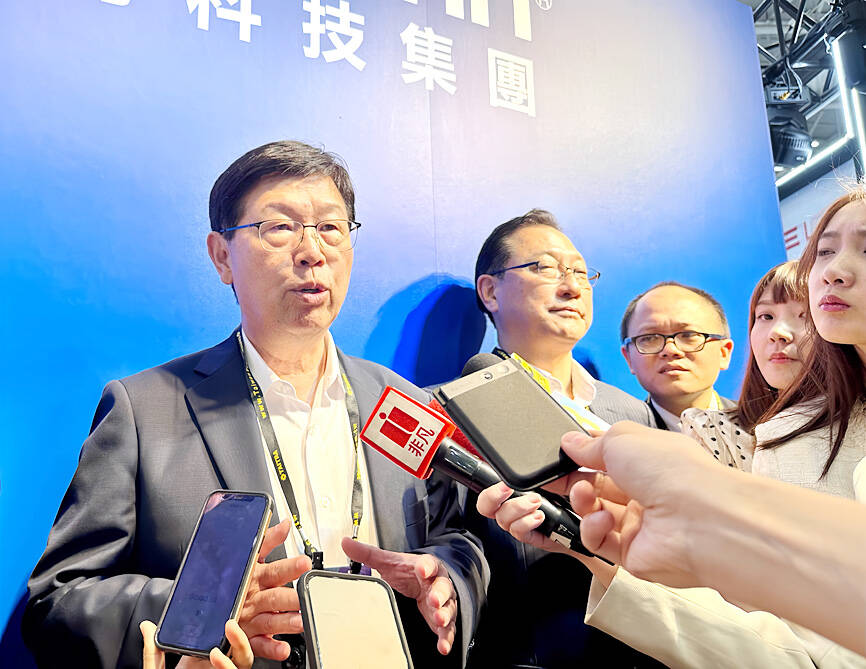Hon Hai Precision Industry Co (鴻海精密), a major iPhone assembler and supplier of artificial intelligence (AI) servers powered by Nvidia Corp’s chips, yesterday said it has introduced a rotating chief executive structure as part of the company’s efforts to cultivate future leaders and to enhance corporate governance.
The 50-year-old contract electronics maker reported sizable revenue of NT$6.16 trillion (US$189.67 billion) last year. Hon Hai, also known as Foxconn Technology Group (富士康科技集團), has been under the control of one man almost since its inception.
A rotating CEO system is a rarity among Taiwanese businesses.

Photo: Fang Wei-jei, Taipei Times
Hon Hai has given leaders of the company’s six core business groups the responsibility to oversee all business groups for six months at a time, Hon Hai chairman and CEO Young Liu (劉揚偉) told reporters on the sidelines of the Taipei International Automobile Electronics Show at the Taipei Nangang Exhibition Center’s Hall 1.
“Every company that aims for a sustainable operation would definitely need a succession plan to support that goal,” Liu said. “This CEO rotation arrangement has several benefits. The system helps our future CEOs better prepare for the job and gives them a view of how the company operates.”
Liu, 68, adopted the dual role of Hon Hai chairman and CEO when he succeeded company founder Terry Gou (郭台銘) in 2019.
Such a dual-responsibility role is commonly seen in Taiwanese companies, but it is different from common practices in the US and Europe, where the chairman’s primary role is to lead the board, while the CEO’s job is to manage the company. Foreign fund managers own 40 percent of Hon Hai’s shares.
Hon Hai has divided its businesses into six groups: smartphones, notebook computers, precision components, PCs and displays, TVs and game consoles, and semiconductors.
Commenting on the global electric vehicle industry’s volatility and a price war in China, Liu said Hon Hai would stick to its goal of seizing a 5 percent share of the global market next year.
“As entry barriers ease, more players are joining this game. This is foreseeable. But it is happening sooner than we expected,” Liu said. “We will benefit from this trend, given our new business model.”
Hon Hai seeks to manufacture TVs for other companies on a contract basis, hoping to duplicate its success in providing electronics manufacturing services for Apple and other electronic brands.
Any escalation in the Middle East would have a major impact on the world as it has caused a stock rout on TAIEX on Monday, Liu said.
“The war is not as far as you might think,” he said.

Semiconductor shares in China surged yesterday after Reuters reported the US had ordered chipmaking giant Taiwan Semiconductor Manufacturing Co (TSMC, 台積電) to halt shipments of advanced chips to Chinese customers, which investors believe could accelerate Beijing’s self-reliance efforts. TSMC yesterday started to suspend shipments of certain sophisticated chips to some Chinese clients after receiving a letter from the US Department of Commerce imposing export restrictions on those products, Reuters reported on Sunday, citing an unnamed source. The US imposed export restrictions on TSMC’s 7-nanometer or more advanced designs, Reuters reported. Investors figured that would encourage authorities to support China’s industry and bought shares

FLEXIBLE: Taiwan can develop its own ground station equipment, and has highly competitive manufacturers and suppliers with diversified production, the MOEA said The Ministry of Economic Affairs (MOEA) yesterday disputed reports that suppliers to US-based Space Exploration Technologies Corp (SpaceX) had been asked to move production out of Taiwan. Reuters had reported on Tuesday last week that Elon Musk-owned SpaceX had asked their manufacturers to produce outside of Taiwan given geopolitical risks and that at least one Taiwanese supplier had been pushed to relocate production to Vietnam. SpaceX’s requests place a renewed focus on the contentious relationship Musk has had with Taiwan, especially after he said last year that Taiwan is an “integral part” of China, sparking sharp criticism from Taiwanese authorities. The ministry said

US President Joe Biden’s administration is racing to complete CHIPS and Science Act agreements with companies such as Intel Corp and Samsung Electronics Co, aiming to shore up one of its signature initiatives before US president-elect Donald Trump enters the White House. The US Department of Commerce has allocated more than 90 percent of the US$39 billion in grants under the act, a landmark law enacted in 2022 designed to rebuild the domestic chip industry. However, the agency has only announced one binding agreement so far. The next two months would prove critical for more than 20 companies still in the process

CHANGING JAPAN: Nvidia-powered AI services over cellular networks ‘will result in an artificial intelligence grid that runs across Japan,’ Nvidia’s Jensen Huang said Softbank Group Corp would be the first to build a supercomputer with chips using Nvidia Corp’s new Blackwell design, a demonstration of the Japanese company’s ambitions to catch up on artificial intelligence (AI). The group’s telecom unit, Softbank Corp, plans to build Japan’s most powerful AI supercomputer to support local services, it said. That computer would be based on Nvidia’s DGX B200 product, which combines computer processors with so-called AI accelerator chips. A follow-up effort will feature Grace Blackwell, a more advanced version, the company said. The announcement indicates that Softbank Group, which until early 2019 owned 4.9 percent of Nvidia, has secured a